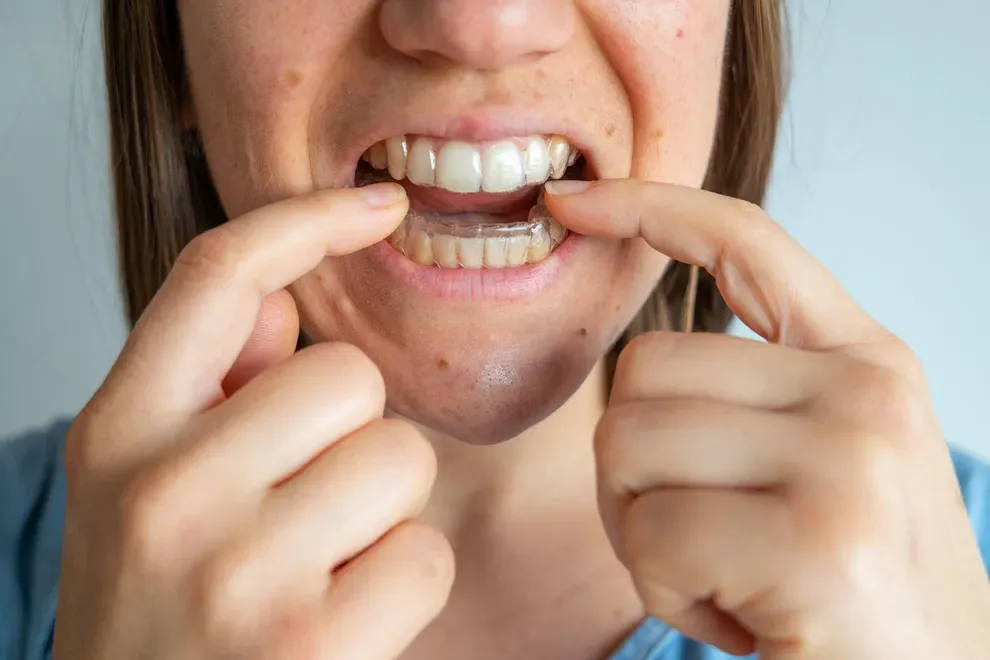Can I Wear Aligners If I Grind or Clench My Teeth?

Table of Contents
- Teeth Grinding Causes
- Alternative Prevention
- Tooth Grinding
- Wearing Aligners
Can you wear aligners if you’re known for teeth clenching? It depends.
Bruxism is a fancy word that means "tooth grinding." Some people clench their teeth together tightly throughout the day (awake bruxism). Others press their teeth together at night (sleep bruxism).
In general, nighttime grinding causes more damage than daytime gritting. Nighttime tooth grinders can't control their actions, and some apply up to 250 pounds of force while they're sleeping.
In 2023, researchers examined all published literature on bruxism and found that aligners had a “neutral effect” on tooth grinding. In other words, they didn’t help with the problem, but they didn’t make it worse. The researchers said doctors should assess patients with a history of bruxism carefully and determine if aligners are right.
If people might be more tempted to grind their teeth when wearing aligners, or their sore teeth and jaws need to heal, another treatment program might be best.
Why Do People Grind Their Teeth?
Muscles and tendons line your face and jaw, and they knit together to help you push your teeth together. Force helps you grind down tough foods. But ideally, you'll grind for just a moment or two until a bite is ready to swallow. People with a grinding habit push their teeth together for altogether different reasons.
You may push your teeth together due to:
Stress. Preparing for a meeting could lead to hours of tooth grinding as you gather notes and imagine tough feedback. Remembering the meeting before bed could leave you gritting your teeth all night long.
Anger. We all have inner voices that should stay silent when we're mad. Gritting our teeth sometimes seems like the best way to keep the words inside.
Tooth placement. Missing or misaligned teeth can lead to grinding. Your jaw muscles work hard all day to keep your jaws aligned, and when they spasm at night, grinding begins.
For some people, grinding is a lifelong habit. For others, it's an issue that comes and goes depending on outside factors like stress. You might be a tooth grinder before the holidays, for example, and feel the urge lessen when the spring arrives.
When are aligners bad for teeth clenching?
You'll submit molds of your teeth before you start wearing aligners. Dental professionals can see the damage you've done in those molds. If your teeth are flat or cracked, and you admit to grinding or clenching often, they can analyze your individual situation and advise on the best course of treatment.
Researchers say that some people tend to clench their teeth more when they’re wearing aligners while awake. The trays can feel foreign and a little slippery, and some people respond by pushing their teeth together. If you already have a history of teeth clenching, wearing aligners in the daytime could make the problem worse.
If you have tooth grinding at night only, aligners may not be helpful either. In a head-to-head comparison of different types of devices for sleep bruxism, researchers found that tooth-grinding appliances (like splints) could help the problem much more than aligners can. These devices reduce the urge to push your teeth together, giving your muscles and tendons a break and allowing them to heal.
Doctors are encouraged to have a frank talk with their patients when they see a history of teeth clenching. If your teeth are already worn and you’ve been unable to break the habit, your doctor may decide that aligners aren’t safe for you.
Get a smile you love right from home.
Transform your smile without going to the dentist. Our clear aligners ship directly to you, and they can cost thousands less than braces.
Other Ways to Stop Grinding
For some people, aligners are the solution to healthy teeth. While they're wearing the devices, they're less likely to clench their molars together. But there are other approaches that can help you to stop grinding and clenching your teeth.
Common tooth-grinding remedies include:
Adjusting sleep positions. Some people only grind their teeth while lying flat on their backs. Switching to a side snooze could help the urge to ease. Try this for a few nights to see if it helps.
Placing reminders. Put up notes around your home and workstation to remind you to relax your jaw and keep your teeth apart. Over time, you’ll start to internalize these cues.
Asking for medications. Muscle relaxants and antidepressants could help people who don't get relief from tooth grinding with any other method. Your doctor may recommend you try these as a short-term solution while you attempt to address the problem via other means as well.
Mindfulness. Yoga, tai chi, and meditation could help to ease your stress. That, in turn, could curb the urge to grind your teeth together.
Each person’s individual treatment plan looks different. But in general, it can take time for the habit to fade. This is even more true if you are a lifelong grinder or clencher. Stick with your homework, and remember that you're working to keep your smile as healthy as possible.
What harm can tooth grinding cause?
You may not realize that you're gritting your teeth at night. But you might awaken each morning with telltale grinding signs, such as these:
Pain: Muscles put to the test all night long can be tender and sore the next day. You might feel this as a headache, earache, or facial tenderness.
Sensitivity: Rub your teeth together with great force, and protective enamel can wear away. Hot or cold drinks could cause intense pain.
Popping: The temporomandibular joint within your jaw can grow sore with tooth grinding. You might hear a pop or click when you open or close your mouth.
Some people make no noise at all while they grind their teeth. But others make an audible and unforgettable impression with their jaws. Your sleeping partner may tell you about the noise, or your coworkers may hear you gritting throughout the workday.
Continued tooth grinding can lead to issues such as damaged teeth, morning jaw pain, headaches, and reduced movement in your jaw. Other symptoms can include the following:
Tooth sensitivity
Broken teeth or dental devices (like crowns and bridges)
Swollen, tender, and stiff jaw muscles
Reduced ability to open your mouth
Clicking sounds when you move your lower jaw
Researchers say untreated bruxism can lead to a poor bite (malocclusion), dental disease, tooth staining, and jaw muscle disorders. People can also sleep poorly, and the loud noises they make while sleeping can harm their sleeping partners too.
